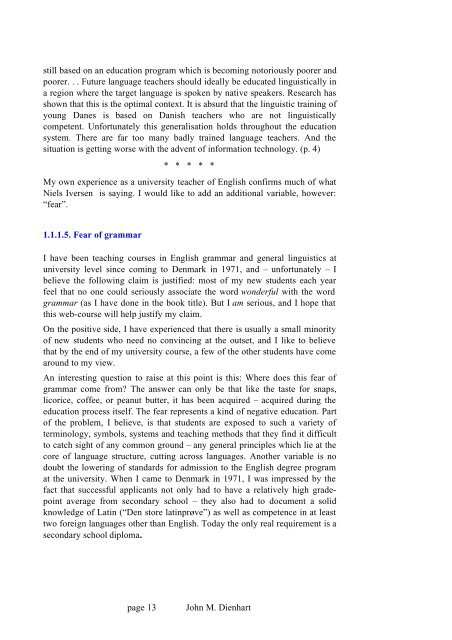Download - VISL
Download - VISL
Download - VISL
Create successful ePaper yourself
Turn your PDF publications into a flip-book with our unique Google optimized e-Paper software.
still based on an education program which is becoming notoriously poorer and<br />
poorer. . . Future language teachers should ideally be educated linguistically in<br />
a region where the target language is spoken by native speakers. Research has<br />
shown that this is the optimal context. It is absurd that the linguistic training of<br />
young Danes is based on Danish teachers who are not linguistically<br />
competent. Unfortunately this generalisation holds throughout the education<br />
system. There are far too many badly trained language teachers. And the<br />
situation is getting worse with the advent of information technology. (p. 4)<br />
* * * * *<br />
My own experience as a university teacher of English confirms much of what<br />
Niels Iversen is saying. I would like to add an additional variable, however:<br />
“fear”.<br />
1.1.1.5. Fear of grammar<br />
I have been teaching courses in English grammar and general linguistics at<br />
university level since coming to Denmark in 1971, and – unfortunately – I<br />
believe the following claim is justified: most of my new students each year<br />
feel that no one could seriously associate the word wonderful with the word<br />
grammar (as I have done in the book title). But I am serious, and I hope that<br />
this web-course will help justify my claim.<br />
On the positive side, I have experienced that there is usually a small minority<br />
of new students who need no convincing at the outset, and I like to believe<br />
that by the end of my university course, a few of the other students have come<br />
around to my view.<br />
An interesting question to raise at this point is this: Where does this fear of<br />
grammar come from? The answer can only be that like the taste for snaps,<br />
licorice, coffee, or peanut butter, it has been acquired – acquired during the<br />
education process itself. The fear represents a kind of negative education. Part<br />
of the problem, I believe, is that students are exposed to such a variety of<br />
terminology, symbols, systems and teaching methods that they find it difficult<br />
to catch sight of any common ground – any general principles which lie at the<br />
core of language structure, cutting across languages. Another variable is no<br />
doubt the lowering of standards for admission to the English degree program<br />
at the university. When I came to Denmark in 1971, I was impressed by the<br />
fact that successful applicants not only had to have a relatively high gradepoint<br />
average from secondary school – they also had to document a solid<br />
knowledge of Latin (“Den store latinprøve”) as well as competence in at least<br />
two foreign languages other than English. Today the only real requirement is a<br />
secondary school diploma.<br />
page 13<br />
John M. Dienhart
















